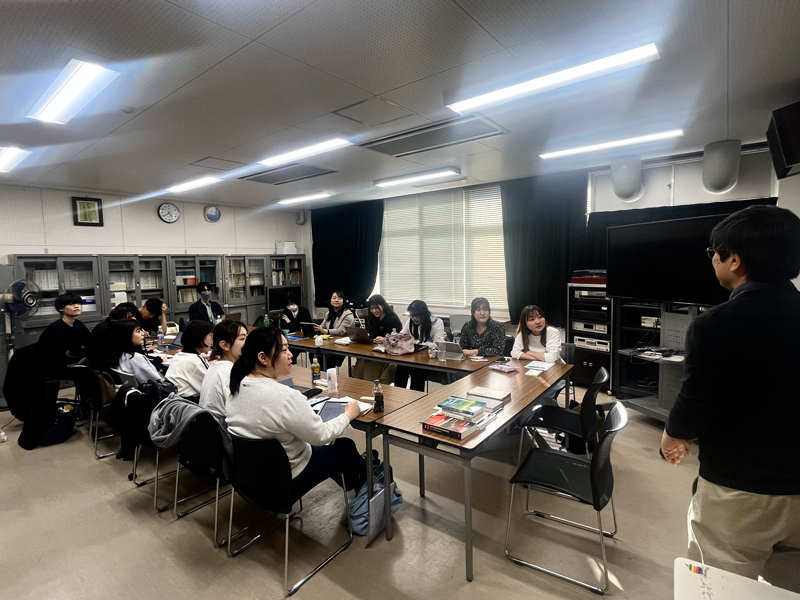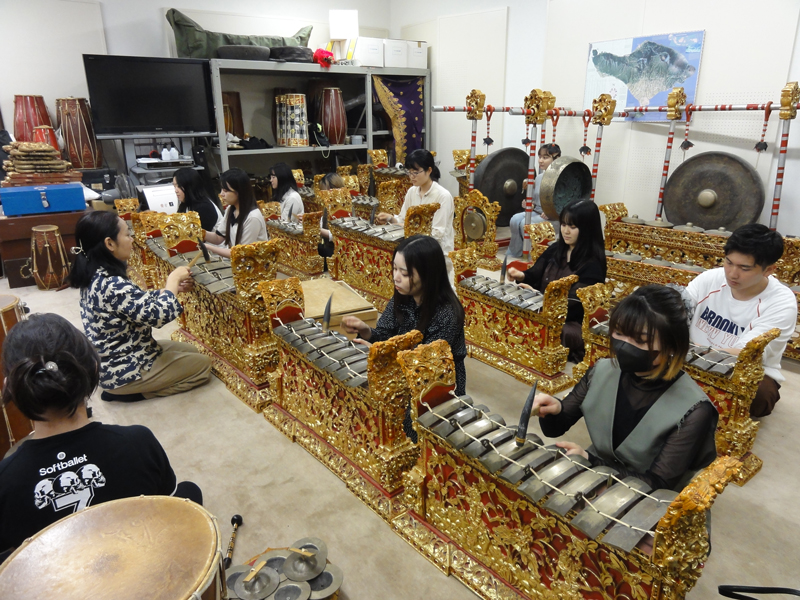DEPARTMENT OF MUSICOLOGY
Department/course summary
The Department of Musicology offers studies of music as most broadly defined. This program is designed to provide students with the knowledge and skills to pursue music-related professions and beyond.
The Department was established in 1949, when Tokyo Music School (founded in 1887) became the Faculty of Music of Tokyo University of the Arts. Ongaku Torishirabegakari (Music Investigation Committee, 1879–1887), the predecessor of Tokyo Music School, was dedicated to both the instruction of musical performance and research of various types of music, including topics in the history and theory of Japanese and Western music. The curriculum of the Tokyo Music School also included courses in music history, music theory, and aesthetics, indicating that these subjects were already recognized as essential parts of a specialized musical education. When it was founded, the Department focused on the history and theory of Western art music.
Over the years, however, it has broadened its scope to encompass the history of Japanese and Asian musics and ethnomusicology, resulting in its current educational and research structure that incorporates a wide range of perspectives and issues.
Classes cover a wide range of musical topics, taught in lectures, seminars, and independent studies. An additional emphasis is given to foreign languages and musical performance.
Graduate courses in the Department of Musicology (master’s and doctoral studies) are also offered.
Policy
Curriculum Policy
Undergraduate program: the courses in the Department of Musicology are designed to train the students to be individuals with an insight into various cultures, past and present, around the world, and skills to present their academic achievements to society. Our curriculum is structured according to six emphases: 1. Historical musicology (Western music); 2. Historical musicology (Japanese music); 3. Historical musicology (non-Western music); 4. Aesthetics of music; 5. Music theory; and 6. Ethnomusicology. In addition to lectures, seminars, and independent studies on topics related to these six emphases, courses in general humanities, foreign languages, specialized music skills (harmony and counterpoint, solfege), and music performance are also required.
Graduate program: the graduate program in the Department of Musicology is structured in three specialized fields: 1. Systematic musicology (Aesthetics of Music and Ethnomusicology); 2. Historical musicology (from the ancient to modern times); and 3. Historical Musicology (Japanese and other non-Western Music). Through tackling the fundamental question, “What is music?”, our graduate students are expected to develop skills and critical thinking with which to approach various musicology-related topics and to conduct research under the guidance of our instructors. In our Master’s program, the students are required to enroll in graduate seminars and independent studies. They may also take courses in other departments with the permission of their academic advisor. A master’s thesis is required for the Master of Arts degree. Our Ph. D. program is designed for graduate students to further their professional research. Students are expected to conduct research under the guidance of the doctoral studies committee. A Ph. D. dissertation is required for the Ph. D. degree. There also are opportunities for our Ph. D. students to present their research findings to our community and beyond.
Diploma Policy
Undergraduate program: The Bachelor’s degree is awarded once the credit requirements have been met. Our graduates are expected to have acquired the following: 1. the ability to think critically and logically based on broad insights and perspectives related not only to music but also to the general humanities;
2. the ability to appreciate music from different perspectives; and 3. the ability to explore a wide range of issues not necessarily limited to musicology per se.
Students who have met specific requirements may have the option of graduating in three years.
Graduate program:
1. Master’s Program: The Master’s degree is awarded once the credit requirements, including a Master’s thesis, have been met. Successful graduates are expected to have acquired specialized knowledge of their research topic and an understanding of related research trends.
2. Ph. D. Program: The doctoral degree is awarded once the credit requirements, including a Ph. D. dissertation, have been met. The dissertation committee comprises a chief academic advisor and several vice-advisors (this may include specialists from outside the department or university). The dissertation defense is open to the public.
Curriculum
Undergraduate studies:
The Department of Musicology seeks to train students to become individuals with an insight into various cultures, past and present, around the world and the skills to present their academic achievements to society.
First and second years: Students are expected to gain fundamental knowledge of musicology-related topics and skills to conduct research. For our students, introductory lectures and elementary-level exercises in each of the six emphases —historical musicology (Western music), historical musicology (Japanese music), historical musicology (non-Western music), aesthetics of music, music theory, and ethnomusicology —are provided. In addition to lectures, seminars, and independent studies on topics related to these six emphases, courses in general humanities, foreign languages, specialized music skills (harmony and counterpoint, solfege), and music performance are also required.
Third year: Students generally attend more specialized lectures and seminars. They also begin independent studies with their chosen adviser and prepare for their bachelor’s thesis. A research field trip is designed as part of the third-year curriculum.
Fourth year: In addition to the above courses, students are expected to complete their bachelor’s thesis. Students who seek to earn the national teacher’s certificate are to take internships at high schools.
Graduate studies:
Students are required to enroll in graduate seminars and independent studies. They may also take courses in other departments with the permission of their academic advisor. In addition, students are expected to complete their master’s thesis.
Ph. D. Program: students are required to enroll in graduate seminars. In addition, they are required to present papers at our doctoral colloquium and other academic occasions, as well as to publish an article in scholarly journals and/or to present papers at outside meetings. The completed doctoral dissertation is to be reviewed by the dissertation committee.
Other information
Graduates of the Department of Musicology are active in a wide range of fields, including music education, journalism, music business, as well as non-music sectors. Some graduates are active composers and performers. Most graduates of our graduate programs hold university teaching positions or are active as independent scholars.
We also actively recruit international students. In the academic year 2025-26, 18 international students from 5 nations are enrolled in our programs. Those international students enjoy many opportunities for international exchange through performances and other activities on and off campus.






